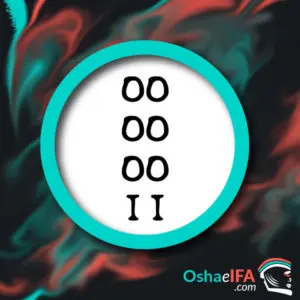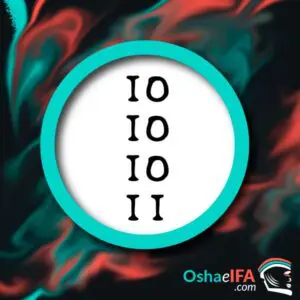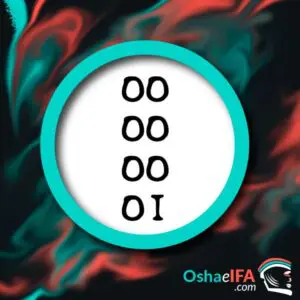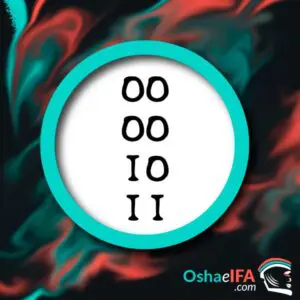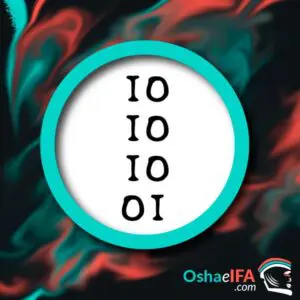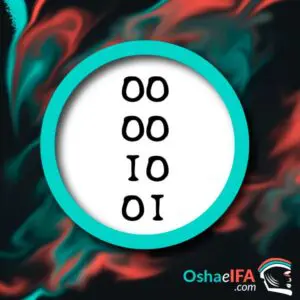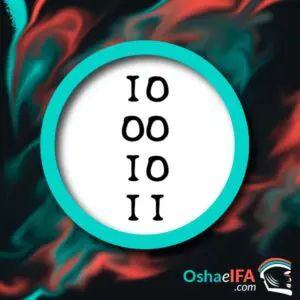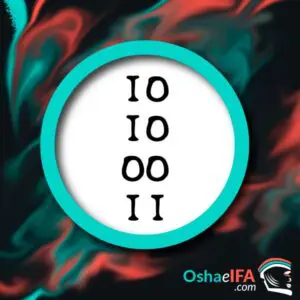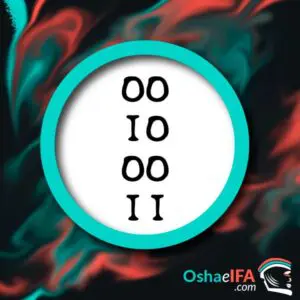Okana Bara (Okanran Obara)

Okana Bara, resulting from the fusion of the Odu Mayors Okanran and Obara, occupies position number 128 in the Lordly Order of Ifá. This sign highlights the critical need to carry out specific sacrifices to ensure offspring and safeguard them against negative influences or witchcraft.
General description of the Odu of Ifa Okana Obara:
What is born in the odu of Ifa Okana Bara?
- That the rose shines for a day.
- Make Ebo in the square to prosper.
- The Tocoloro as a bird of the Odu.
- That when Obalata turns his back on him, there is no Saint who saves him more than ORUNMILA.
- KANEPO: Saint of the earth Mina Popo.
- The liberation of the slaves.
- Where everyone's skills were tested.
- That Obatala was Olofin's goalkeeper.
- In Okana Bara is born: That Tocoloro never comes to the city.
- The betrayal of Shango by Elegua and Osain.
What is the Okana Bara sign talking about?
- That the one who works God helps him.
- The descent of the yam and the mud-cement of Heaven.
- Orunmila went to Obatala Square.
- They did not want the King as a warmonger.
- Obatala recognizes his mistake.
- We must receive Eshu Laroye.
- Shango cried for the betrayal of the people.
- Women fall in love with old men.
- The person is Awó from the other world.
- The person likes to raise their hand.
- The king was a tyrant with the slaves.
- The Carpenter and the Tocororo were arguing about a woman.
- They declared war on Orunmila's children.
- Lightning strikes the house. The natural disaster.
The Okana Obara sign points out:
- Death (Ikú) chases a talkative man.
- Elegua would put the animals on the flowers to eat.
- The Herbs are: Jiquí, yam, win war, cotton, moruro, ashen, daguilla and diame.
- When the Awó is seen this Odu has to wash his head with what marks Ifá.
- The mother, even after death, takes care of him.
You may also like: Ifa Obara Kana sign
Analysis and Reflection of the Ifa sign Okana Bara
Okana Bara reminds us of the ephemeral beauty of life, symbolized by the rose that shines for only one day, and underlines the importance of performing ebbo in the square to prosper, highlighting proactive action in the pursuit of personal and spiritual growth. The figure of the Tocoloro, as a bird of the Odu, and the protection that only Orunmila can offer when Obatala turns his back, emphasize the interdependence of divine forces and the importance of maintaining a balanced relationship with them.
Economic Aspects
The liberation of slaves and the recognition of individual abilities are powerful metaphors for economic emancipation and self-discovery. In this Odu, prosperity is achieved through introspection, diligent work and respect for traditions. Okana Bara's story teaches us that true success comes from understanding our place in the world and acting with integrity and determination.
"Salud"
The recommendation to do ebbo to avoid natural disasters and premature death underlines the Yoruba conception of health as a state of comprehensive balance that includes physical, spiritual and environmental well-being. This Odu advises caution and proactive care, reminding us that our environment and actions have a direct impact on our health.
Religious Aspects
Okana Obara reveals the complexity of relationships between the orishas, showing how divine dynamics reflect lessons for human life. From Shango's betrayal to his crying for disloyalty, we learn about the importance of fidelity, repentance and forgiveness. This Odu encourages us to seek spiritual guidance and make the necessary sacrifices to maintain harmony and divine favor.
Personal relationships
This Odu addresses the complexities of love and personal relationships, warning about the dangers of infidelity and contempt. The story of the carpenter and the Tocororo disputing the love of a woman reminds us that passion must be balanced with respect and mutual understanding. Okana Bara teaches us that true love is built on the foundation of honesty, sacrifice and commitment.
Okana Bara invites us to reflect on our mortality, our actions and our relationship with the spiritual and natural world. He teaches us that every choice we make has consequences, both for ourselves and for others, and that true wisdom lies in living a balanced and harmonious life. This Odu reminds us that we must act with responsibility, respect and compassion, always seeking spiritual growth and reconciliation.
Recommendations
- Perform Ebbo in the Plaza: To ensure prosperity and counteract negative effects, it is crucial to perform ebbo in public places, symbolizing connection with the community and the universe.
- Respect and Protect Nature: Recognize the importance of each natural element, such as Tocoloro and the specific plants mentioned, and use them wisely in rituals and offerings.
- Honor Ancestors and Deities: It is essential to recognize the role of Obatala, Orunmila, Eshu Laroye and Shango, making offerings and sacrifices to gain their favor and protection.
- Avoid Conflicts and Act with Integrity: Stay away from disputes, especially those that can lead to serious consequences such as betrayal or injustice.
- Beware of Premature Death and Natural Disasters: Take specific precautions to protect yourself and your home from physical and spiritual threats.
- Promote Family Unity: Work towards harmony within the family, making sacrifices if necessary to ensure peace and collective well-being.
prohibitions
- Don't Brag or Be Proud: Humility is crucial in this Odu; Avoid the temptation to boast or put others down, which can attract negativity and enmity.
- Do not ignore the sacrifices suggested by Ifá: Neglecting the recommended eboses can result in serious repercussions for your overall health and well-being.
- Avoid Conflictive Relationships: Both on a personal and professional level, one should avoid getting involved in relationships that could result in betrayal, violence, or serious misunderstandings.
- Do Not Provoke Enemies: Act in a way that does not incite envy or hostility, especially in the workplace or within the religious community.
- Do not disregard the advice of elders: The wisdom of elders and spiritual guides must be respected and followed to avoid errors and transgressions.
- Don't Neglect Home Protection: It is essential to take measures to safeguard personal space against negative influences and physical dangers.
You can read: Shango, Yoruba deity of thunder, justice and bravery, rules with his double ax and ignites passions.
Treaty and predictions of the Okana Obara sign:
The Ifá sign Okana Obara announces and foresees the following:
The eboses that Òrúnmìlà advises must be carried out, in order to avoid premature death, that is, at a still relatively young age.
For people under this Ifá sign, it is recommended to avoid living in regions or cities prone to natural disasters, since in this odu, the person's house could be affected by these types of situations.
Under the astral system of the oddun Okana Bara, the person could experience periods of pressure where the general growth rate (iré omó) is relatively limited. Therefore, it is necessary to carry out eboses frequently to facilitate everything related to the necessary material growth.
People with this Ifá sign in their Itefa (not isefa) must be very attentive to maintaining good relationships with their elders of religion and family, as well as with minor children and godchildren or those recently initiated into the religion.
Regarding this odu, it is crucial to avoid all types of conflicts. Intelligence must prevail over the tensions inherent in this odu, which is approximately 75% aggressive, while only expanding or facilitating by 25%. However, if the person with this odu has Orisha-nla as his Orisha, he could have a better ability to handle the adverse situations that it announces.
When "baptizing" or congratulating the person with his religious name under this Odu of Ifá (Okana Obara), one must first consult with Òrúnmìlà if he will be called malasoni or olaogun, in honor or reverence to two ancestral lineages related to the Odu in question.
In this Ifá odu, it is necessary to perform frequent works for health well-being. Faced with these types of problems, you should consult with the ORI of the interested party through Ifá if it is highly recommended to start the Ifá priesthood in an accelerated manner.
There is the possibility that the individual with this Odu, whether from isefa or itefa, occasionally resists performing the suggested Ebó, or postpones it indefinitely. This would be detrimental to his health and could lead to the development of the previously mentioned adversities.
Under the directive of this Odu of Ifá, the person's home must be protected through a strong inshé of Shango, advised by the corresponding Orisha and complemented with the recommendations of Òrúnmìlà. Thus, the house will be adequately protected from thunder, lightning, electric shocks of all kinds and short circuits caused by landslides, among others.
Sayings of the Odu of Ifa Okana Bara:
- Don't underestimate the little one.
- Luck and misfortune on the street has someone to take care of them.
- He who lives by the sword will die by the sword.
- The whim is the downfall.
- He who works, God helps him.
- The horse cannot find the way in the bush.
- The rock has no place in the Sun.
- The corn comes out together.
"He who lives by the sword will die by the sword" is a saying that emphasizes the inevitability of the consequences of our actions. This principle, rooted in justice and moral balance, reminds us that every act, good or bad, brings with it a corresponding result. As in the principles of Ifá, this saying teaches us about responsibility and self-examination, urging us to act with integrity and awareness of the impact our decisions have on our environment and on ourselves.
Odu Okana Obara Ifa Code of Ethics:
- The Awó studies and prepares for life.
Says Ifa Okana Bara:
When Okana Bara appears in an ordinary record, the person is told to make sacrifice to avoid suffering at the hands of an enemy. The sacrifice must be made with a goat, white cloth, a club and candles for ESHU and a rabbit for the Night.
When this sign of Ifa appears in an ordinary record for a woman, she is warned that she must serve ESHU with a goat to avoid marrying a man who will always be beating her and will not be able to escape her clutches. If it is for a man, he will be advised that he must receive his own Ifá after having served ESHU with a goat to avoid the consequences of great ingratitude.
When this Ifá appear IGBODU, the person is warned that he should serve Ifá with a ram and two chickens, ESHU with a goat and water palm branches on his altar. After sacrificing the goat to ESHU, the person must cut the palm branches to leave the altar and thus mark their exit from Heaven.
The plant and leaves called Malekpo should be forbidden to him. In an ordinary search the person must offer a goat to ESHU out of envy in his workplace. A strong person is planning to kill you for your exemplary performance at work. You must resist the temptation to be boastful.
When this ODU appears in an ordinary record, the person will be told that they must perform these sacrifices to prevent them from being stripped of their children by the Cult of Witchcraft.
When the sign of Ifa Okana Bara appears in an ordinary record, the person is told that he must make sacrifice to avoid becoming a victim of malicious falsehood.
When Okana Obara appears in an ordinary record, the person will be told that there is no unity in his family. They must make sacrifice so that unity among them returns.
Prayer of the Odu Baba Okana Obara:
OKANA OBARA LODAFUN ORUNMILA NI PATAKI KODOFA ESHU IFE LEDOYA
ELEGBARA LARILE MIATILE AWO ANOTIWO ATELE ESE NITASE
ADIFAFUN ONI BARANANIREGUN AMBATELE YOLAI BENEKU AWADO AKUKO
LEBO KAFEREFUN SHANGO ATI OYA.
Eboses (Works) by Oddun Okana Obara:
Work by Okana Obara for Obatala
The essence of this Odu is to offer two white doves to Obatala.
For Awó:
You must wash your head with the elements that Orunmila specifies.
Ebbo for prosperity:
- A rooster for Fifeshu.
- Abundant yams.
- A jar full of coins.
- Toasted corn.
- Jutía and smoked fish.
- A considerable sum of money.
Ebbo for protection and well-being:
- A rooster and two white doves.
- Land of a significant place.
- Root of a fallen tree.
- Two pieces of wood.
- A chain and a trap.
- Clothes soaked with sweat.
- Ritual fabrics.
- Jutía and smoked fish.
- Money in quantity. This Ebbo must be taken to the square and, upon returning, it will be consulted whether the two white doves are offered to Obatala or Shango.
For the head:
It is advisable to use a two-color hat. You should check which colors are appropriate.
Okana Bara Ebbo to achieve wishes:
It is required to enter the mountain with seven specific herbs and, upon leaving, clean oneself (sarayeye) with a rooster, throwing it back without looking.
For fertility:
The sacrifice will include a rabbit, a chicken and a cotton stick.
To avoid a harmful marriage:
A goat will be offered to Eshu.
To health:
A sheep will be sacrificed and a significant amount of money will be offered.
These offerings and rituals, dictated by the Odu Okana Obara, seek to harmonize the lives of practitioners with spiritual forces, promoting health, prosperity, and protection against adversities. It is essential to follow the instructions of Ifá and perform the ebbo with faith and respect for the deities.
You may also like: Treaty of the Odu Iwori Bosa
Meaning of the Sign of Ifa Okana Bara
The Odu Okana Bara focuses on preventing premature death and avoiding natural disasters that can destroy our homes. Warns about possible family conflicts, both with children and parents.
To achieve the desired objectives under this Odu, it is necessary to enter the mountain with seven herbs. Upon returning, a cleansing ritual (sarayeye) must be performed using a rooster, which will be thrown back without looking, as an act of purification.
It is vital to resist the temptation to be conceited, as there is someone with power who could try to harm you because of your outstanding work performance.
The Odu emphasizes the importance of pumpkin and melon as favorite foods for humans.
Ola Ogún faced the risk of premature death and natural disasters in his home. It is crucial to be alert for storms and lightning.
This Odu alerts us to the danger of premature death and how even talkative people can be haunted by death.
Olofin's wife was falsely accused of infidelity, becoming the victim of harmful slander.
The work done under Okana Bara was mocked and ridiculed.
It warns about the risk of being oppressed by humanity, illustrated through the process of capturing and crushing mud or cement for construction.
The yam, before being cooked and consumed, is cut and crushed, symbolizing transformation and consumption.
The enemies seek to subjugate the descendants of Orunmila, preventing them from advancing freely.
Shango ended up impoverished and despised, while Obatala was treated with disdain.
The need to make sacrifices to avoid suffering caused by enemies and draw personal conclusions from these situations is emphasized.
The Odu warns that one can be left alone and see their home destroyed by fire.
Women should be careful not to end up with a violent man, and men should avoid being ungrateful.
The possibility of being a victim of malicious deception and the lack of family unity are present risks.
Finally, Eshu destroys all the edible flowers and plants in the garden, symbolizing the destruction of what is beautiful and necessary for life.
Pataki of the Ifa sign Okana Obara: Gold the wife of Olofin
A divination was performed for Oro, Olofin's favorite wife, who was unjustly accused of infidelity. Olofin, blindly believing the accusation, ordered that Oro be stripped naked and paraded around the outskirts of the palace. Seeking justice, Oro took refuge in Orunmila's house, who, after dressing her and comforting her, confronted Olofin to defend her innocence. Despite Orunmila's efforts, Olofin stood by her decision, based on tradition, not to allow Oro to return to the palace.
Later, Orunmila divined for Oro, telling him to make a sacrifice to improve his life. Without resources due to her expulsion, Orunmila provided her materials and performed her sacrifice for her. Over time, Orunmila and Oro fell in love and began to live together.
A catastrophe in the palace, along with the confession of the conspirators, called into question Olofin's ability to govern. Upon seeking help from Orunmila, it was revealed that the severity of Oro's punishment had enraged Eshu Eleggua. Olofin, following the indications of divination, made the necessary sacrifices, restoring peace and harmony in the kingdom.
Explanation: This story teaches us about the importance of justice, compassion and forgiveness. It highlights the danger of acting under prejudice and without adequate investigation, reminding us that the truth always finds its way. Orunmila's generosity and love towards Oro demonstrate how kindness can transform lives, even in the most difficult circumstances. Peace and harmony are only restored when we recognize our mistakes and seek to right them with just and compassionate actions.
You may also like: Odu of Ifa Iroso Tolda
Okana Obara Ifa Traditional
ÒKÀNRÀN ÒBÀRÀ
Okàn bàbààbà Awo ilé Olóbà
A day fún Olóbà Abèdú
Omo a yín gínní gínní bomo lénu
Wón ní ó rbo
Olóbà Abèdú ni n bèèrè lówó Ifá
Pé òún rífà je bí?
Ayé òún dára báyìí?
Wón ni ayée rè ó daa
Wón ní yóó bìí omo lópòlopò
Enú àwon omo è or sì tómú
Nnkan è ò yes níí bajé
Olóbà Abèdú bá rubo
Omo ó nì mòmó mó
Ní bá n yín gínní gínní somo lénu
Ní wá n jó n ní n yò
Ní n yin àwon Babaláwo
Àwon Babaláwo n yin Ifá
Ó ní béè làwon Babaláwo tòún wí
Okàn bàbààbà Awo ilé Olóbà
A day fún Olóbà Abèdú
Omo a yín gínní gínní bomo lénu
Wón ní ó saca káalè ó jàre ebo ní ó se
Olóbà Abèdú gbébo nbè or rubo
Kín lOlóbà n je?
Ifa
Ifá lOlóbà n je
Ifa.
Ifá wants this person to be well. Good things will come to him. He would have a good wife and the woman will give him many children.
Òkàn bàbààbà, the Babaláwo of the house of Olóbà,
He made divination for the Olóbà Abèdú
The son of 'a yín gínní gínní bomo lénu'
They advised him to make sacrifice
Olóbà Abèdú was asking Ifá
'How could I get gifts?
'Would my life improve?'
They said their life would get better
And that he would have many children
Your children will be successful in life
Your things wouldn't go bad
Olóbà Abèdú made the sacrifice
The children became many
He started cutting pieces of food in the babies' mouths then
He began to dance and rejoice
He was praising his Babaláwos
His Babaláwos were praising Ifá
He said it was exactly as his Babaláwo had said
Òkàn bàbààbà, the Babaláwo of the house of Olóbà,
He made divination for the Olóbà Abèdú
The son of 'a yín gínní gínní bomo lénu'
They advised him to take care of the land and make the sacrifice
Olóbà Abèdú heard about the sacrifice and performed it
What is the Olóbà enjoying?
Gifts
Gifts is what Olóbà is enjoying
Gifts.
